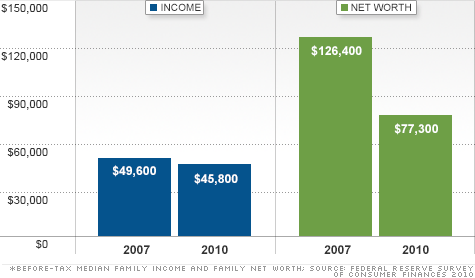| 金融危机对美国家庭的影响 一场金融危机下来,几家欢乐几家愁。金融危机对不同经济阶层家庭的不同影响到底有多大,一直就是人们关心和关注的议题。只是,企业家、经济学家、政治家和社会学家等不同的人,会从不同的解读进行解读罢了。 按照下面的报告来看,美国最富有的10%的家庭,其中间家庭的净资产,在金融危机之后的2010年时,相比危机之前的2007年,还略有上升,从117万上升到119万。 对于这个数字,我有点难以理解:美国最富有的10%家庭的中间净资产,怎么会只有区区100万多一点?好像不是很对头。 由于这次金融危机是基于房地产泡沫导致的,所以,在地产上的资产,大家的损失都比较大。只是,不同的人,由于资产配置的不同,所受损失的程度也有很大的差别。那些将资产主要压在地产上的中产阶级家庭,由于地产在很多地方还没有真正恢复,所以,他们之中的多数还生活在“水深火热”之中。很多人可能还在“负资产”的尴尬中硬扛着。 同时,又由于经济不景气,就业情况不理想,那些靠出卖劳力吃饭的人,在面临工资和薪水收入下降之后,财富也不得不跟着下跌。 从这里看,我们似乎是应该明白一个道理:只靠自己出卖劳力来积累财富和期望就此过上好日子,在经济好的时候,你感觉不出风险,而在经济不好的时候,你可能就感觉到伤害了。机会的丢失本身,就是一个损失,而有损失,就是风险已经发生效果了。 美国是个讲究冒险的国度,美国人喜欢承担风险,也从这种敢于冒险的行为中获得了巨大的利益回报。这不,领导世界经济潮流的美国企业,不仅仅有像苹果和谷歌这样的科技巨头,还有像麦当劳、星巴克、沃尔玛这样的“普通”玩家。美国每年有大量的新企业产生,同时,又有大约10%的企业在消亡。 新陈代谢,吐故纳新,前赴后继的尝试,就是美国特有的企业家精神的体现。 今天早上看到一则消息:在金融危机之后,由于佛罗里达州商业地产和居民地产的价格,在很多地方已经下跌一多半,于是,就有来自南美的阔佬们就此在那里收购和投资。一位一口气就买下了1700万价值的海滨公寓。现在看来,这种捞底的行为,还是比较有胆识的做法。今天的南佛罗里达,比较好地段的公寓,据说已经有80%以上的,要么有主,要么已经被出租。这之中,很多房子,一度被人遗弃,成为流浪汉的临时住所。 相比南美富商的投资嗜好,和中国富人为了摆阔和享受而在美国买房的不同行为,大家在几年之后,就能够看出巨大的差别了。 Family net worth plummets nearly 40% By Charles Riley @CNNMoney June 12, 2012: 12:12 PM ET 
Income and net worth fell from 2007 to 2010. NEW YORK (CNNMoney) -- The average American family's net worth dropped almost 40% between 2007 and 2010, according to a triennial study released Monday by the Federal Reserve. The stunning drop in median net worth -- from $126,400 in 2007 to $77,300 in 2010 -- indicates that the recession wiped away 18 years of savings and investment by families. The Fed study, called the Survey of Consumer Finances, offers details on savings, income, debt, as well as assets and investments owned by American families. The results, though more than a year old, highlight the marked deterioration in household finances brought on by the financial crisis and ensuing recession. Much of the drop off in net worth -- to levels not seen since 1992 -- was attributable to a sharp decline in housing values, the Fed said. In 2007, the median homeowner had a net worth of $246,000. Three years later that number had fallen to $174,500, a loss of more than $70,000 on average. Families who reside in the west and south, where the housing market was especially hard hit by the recession, were worse off than their peers in the rest of the country. Making matters worse, income levels also fell during the tumultuous three-year period, with median pre-tax income falling 7.7% as earnings from capital gains all but disappeared. The loss of income and net worth appears to have impacted savings rates, as the number of Americans who said they saved in the prior year fell from 56.4% in 2007 to 52.0% in 2010 -- the lowest level recorded since the early 1990s. At the same time, some families were able to escape from debt, as the share of families with debt decreased slightly to 74.9% over the three-year period. Credit card use was down, and the median account balance fell 16.1%. Meanwhile, families who did report carrying debt showed little change in the degree of indebtedness over the period. Lower interest rates helped keep debt levels down, but the number of Americans who had fallen more than 60 days behind on debt payments still grew from 7.1% to 10.8% in 2010. The report also indicated that families with more assets at the start of the recession were able to retain more of their net worth than less fortunate families. Families in the top 10% of income actually saw their net worth increase over the period, rising from a median of $1.17 million in 2007 to $1.19 million in 2010. Meanwhile, middle-class families who ranked in the 40th to 60th percentile of income earners reported that their median net worth fell from $92,300 to $65,900 over the same time period. First Published: June 11, 2012: 12:07 PM ET |
